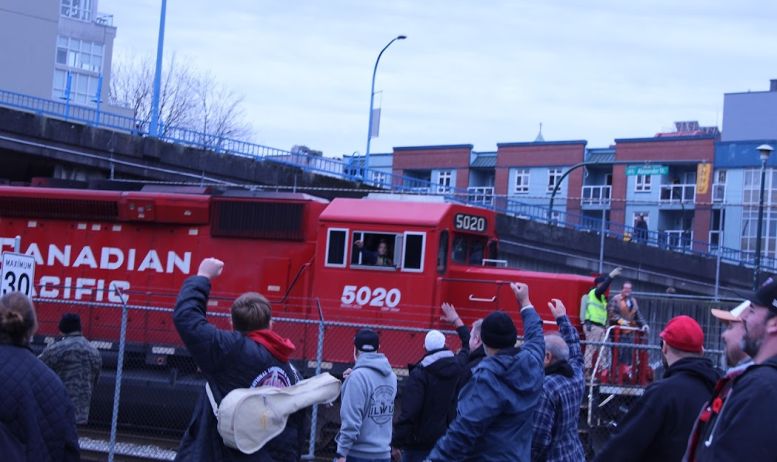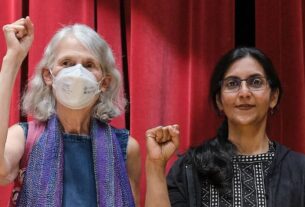Solidarity with Longshore
The Federal Labour Minister, MacKinnon, has imposed compulsory arbitration on the disputes that have closed the ports along BC’s coast and in Montréal. The ports were closed after the employers locked out the workforce. Canada’s three busiest cargo ports, Vancouver, Montréal and Prince Rupert, were shut. With MacKinnon’s action on November 12, the ports will re-open.
The employers in BC, BC Maritime Employers Association (BCMEA), and in Montréal, the Maritime Employers Association (MEA), seemed to be acting together to push the government impose arbitration. As Michel Murray, a union spokesperson in Montréal stated, “The lockout in Vancouver, the lockout in Montréal, we see as a co-ordinated, planned group effort to put pressure on the government to intervene.”
In BC the 700 foremen, members of International Longshore and Warehouse Union (ILWU) Local 514, were locked out on November 4, after the union banned overtime and gave 72 hours notice of a possible strike. In August, 96 percent of the members voted for strike action. The workers have been trying to negotiate a new contract for over 18 months, since the previous contract expired on March 31, 2023. The 1,200 workers in Montréal, members of the Port of Montreal Longshoremen’s Union, which is Local 375 of the Canadian Union of Public Employees, have been without an agreement since December 31. They were locked out on November 10, after rejecting the employer’s final offer by 99.7 percent.
In both cases the dispute is about much more than wages.
Workers Want to Protect Jobs and a Life
The main issue in the BC dispute is staffing levels and automation, an issue also in last year’s port strike. Evidently, at the centre of the dispute is a disagreement with one member of the BCMEA, DP World (Canada). It operates container ports in Vancouver, Surrey, Nanaimo and Prince Rupert. Initially the union wanted to have a strike only at that company, but the Canada Industrial Relations Board prohibited that. DP World is a Dubai-based corporation that had an operating profit of US$5 billion in 2023. It is notoriously anti-union. In 2022, it fired, by video message, 800 workers on P&O Ferries, who were replaced with lower-paid agency workers, many not even getting the minimum wage.
A key concern for Montréal workers is scheduling with employers trying to undermine the work-life balance. Termont, a major operator in the port, changed schedules to the detriment of the workforce. The union fears this will spread across the port if not stopped. Termont is owned by Logistec, which had profits (before taxes, etc.) of US$142 million in 2022. The Montréal employers have also offered a worse pay deal than the offer in BC or agreed in Halifax.
Employers Avoid Negotiations
The employers successfully pushed the federal government to intervene. They escalated the disputes with the lockouts. In BC, they did not even turn up to a meeting with the union and the federal mediator on October 31, four days before they issued the lockout. Another meeting with the mediator was called on November 10 but, according to the union, the employers left after only 12 minutes!
In Montréal, although the employers and union met with a mediator, the employers did not address the issue of scheduling. In both disputes, the employers have stated that they have made their final offer and are not willing to budge, so see no point in mediation.
Of course, the voices of big business immediately started crying about the impact on the economy and demanding government action. Not a word of criticism at the employer for dragging out negotiations or for the lockout. The bosses stick together, even if they take a short-term hit to their profits.
Until now the Liberals had stated that the two sides should negotiate. But the employers’ stonewalling paid off. Now every employer will know if they do not negotiate seriously the government will intervene.
MacKinnon ordered compulsory arbitration for the rail dispute in August. The arbitration is not starting until March 2025.
Socialist Alternative wrote of that compulsory arbitration, “This flouts the democratic rights of workers to go on strike. The workers voted, with 99 percent in favour, for the strike. The Supreme Court of Canada has ruled that workers have right to strike.
“This is an attack on all workers. If employers stall negotiations and then get the government to intervene, the right to strike is meaningless.”
The same big corporations operate the ports in BC and Montréal. Their “confrontational tactics” — not negotiating, undermining working conditions and employment and locking out the workers — in Canada’s major ports indicate they want to attack the workforce and its hard-won gains. They are hoping that the imposed arbitration will do their dirty work.
Workers’ Control of Ports
Canada’s major ports are publicly owned; however, they are operated by and for highly profitable international corporations. MSC, Maersk, CMA CGM, Cosco and Hapag-Lloyd are the world’s five largest container shipping companies controlling some 65 percent of world container traffic, with profits well over US$110 billion in 2022. All are part of both the MEA and the BCMEA. The ports are run for the benefit of these and other multibillion dollar corporations, not for the workers in the ports or those who rely on the ports, Canadian society or the ports’ neighbours.
For sane policies to protect the environment, employment, and safety the running of the ports should be in the hands of the public. Get rid of profit-gouging corporations. The workforce, including longshore, and truck drivers and train crews who use the port, know how to best plan the day-to-day running of the ports. Wider strategic decisions should include the communities around the ports and wider society, who rely on the ports for the import and export of goods, food and products.
An Injury to One is an Injury to All
Longshore workers in BC and Montréal have enormous economic power. This struggle is relevant to the wider labour movement and solidarity is in labour’s best tradition.
In Vancouver on Friday, November 8, a solidarity rally of a thousand ILWU members, members of many other unions, and supporters marched through the port.




